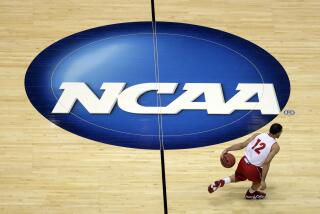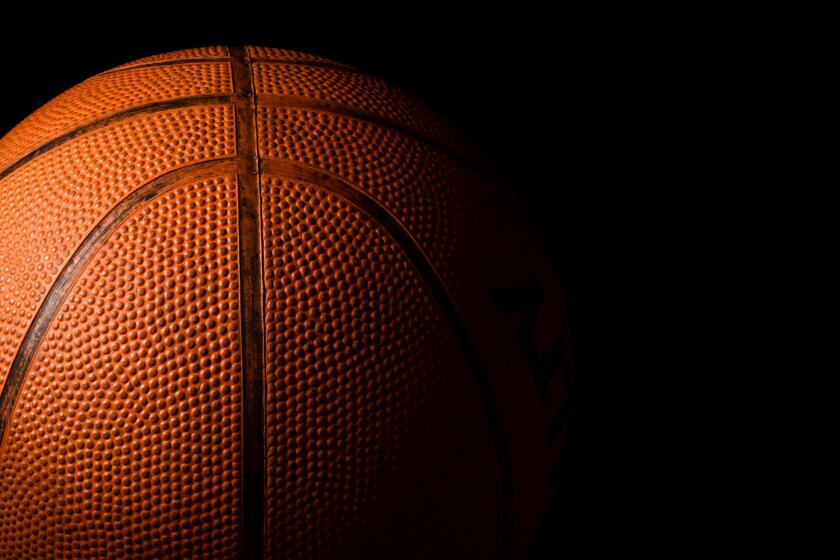Gambling Is Big Part of Madness
- Share via
LAS VEGAS — If you’re reading this, odds are you’re interested in the NCAA basketball tournament. If you’re starting to sweat while doing so, odds are you have a few dollars on the games.
Twenty bucks in the office pool is the accepted wager across most of America. But guys stood in lines 20 deep in Vegas casinos Thursday to bet such things as whether Southern will ever have a lead in its game against Duke.
That’s enough to horrify the NCAA by itself. But it gets worse.
Like the chances of a No. 13 seed winning a game? All it takes is a few clicks of the mouse and you can get 6-5 on it from the privacy of your house.
And who knows how much of mom and dad’s money from home is being wagered in dorm rooms everywhere.
The Super Bowl has nothing on this. By the time the nets are cut down a few weeks from now, billions of dollars will have changed hands.
The NCAA frets about that, partly because it rightfully wants to protect the integrity of its games and partly because it always seems to like to take the high moral ground.
But it also indirectly profits from it, making millions without ever having to make a bet itself.
Those running the tournament would never admit it, but the NCAA’s annual get together of 64 teams owes much of its success to the fact that much of America has a small financial interest in the outcome.
Call it hypocritical, but that didn’t stop the NCAA from dragging out its doom-and-gloom lines last week about how sports betting must be stopped to protect the game. Surely, though, the organization must secretly hope it doesn’t get what it wants.
That’s because people who can’t tell the difference between a three-pointer and a slam dunk, who don’t know Bucknell from Bradley, suddenly become big fans when they have a few dollars on the line. That means ratings for CBS, and millions more in the pockets of the NCAA and its member schools.
It’s the biggest reason March Madness has gotten so, well, mad.
“Whether you’re a student, housewife, senior citizen or doctor I think the whole country calls it March Madness for a reason,” said Simon Noble, who runs the offshore betting site PinnacleSports.com. “Whether it is brackets or taking the next step and making a wager, I think everybody’s doing it.”
Well, not everybody.
NCAA president Myles Brand certainly won’t be filling out his bracket at NCAA headquarters in Indianapolis, probably the only office complex in the country where there is no pool on the tournament.
If NCAA staffers didn’t know before what zero tolerance meant, they found out when Rick Neuheisel was fired as football coach at the University of Washington for winning a basketball pool. Of course, Neuheisel won a $4.5 million settlement, proving that betting sometimes really does pay off.
The NCAA justifies its position by pointing to point-shaving scandals of old, and a 2003 study it commissioned that showed 2.1 percent of Division I basketball players admitting they had been asked to throw a game.
The concerns are valid up to a point because the organization is charged with protecting the integrity of the game. But it was Las Vegas bookmakers, not NCAA investigators, who smelled something fishy and called authorities when Arizona State players tried to tank games a decade ago.
The guys handling the money are always going to be the ones looking out for it.
“We are on the same side as the NCAA,” said Jay Kornegay, who runs the sports book at the Las Vegas Hilton. “We want nothing but a fair and true game. If anyone is going to get hurt by a crooked or fixed game it’s the bookmakers.”
The NCAA seems to have finally realized that. A few years ago it went to Congress to try to outlaw betting on college games in Las Vegas, but now it’s reaching out to its archenemy to work together to prevent anything funny.
An investigator is in town this week to hang around the sports books and talk with bookmakers, but the NCAA could have saved its travel money.
No one is buying games or shaving points in this tournament. It rarely happens anymore, and it never happens in games anybody in Las Vegas is paying attention to.
There’s a better chance of finding conspiracies in the tournament selection room in Indianapolis than in a sports book in this gambling city.
So, get your brackets out, sit back and relax.
And don’t start thinking something is fishy if J.J. Redick misses a few free throws.
More to Read
Go beyond the scoreboard
Get the latest on L.A.'s teams in the daily Sports Report newsletter.
You may occasionally receive promotional content from the Los Angeles Times.










